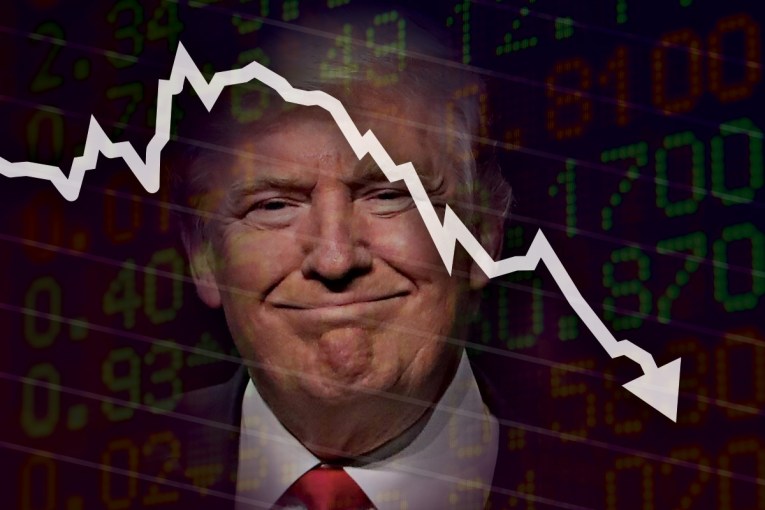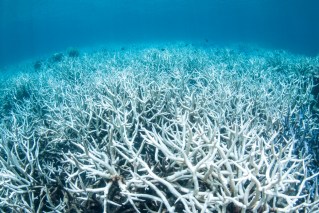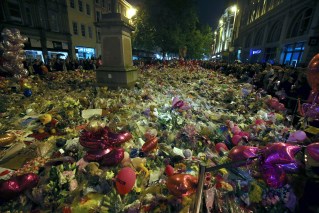So long, farewell: Famous people who died in 2013
Actors, scientists and political heroes all said farewell for the last time in 2013. Here is a list of the famous folks who won’t be joining us in 2014.
JANUARY
January 15
Nagisa Oshima, Japanese filmmaker, directed Furyo, (also known as Merry Christmas, Mr Lawrence), aged 80. Originating the Japanese new wave cinema in the 1960s, Nagisa Oshima was also the most famous director. In 1978 he won the Cannes Film Festival best director award for Empire of Passion. Merry Christmas, Mr Lawrence, which was partially in English and featured David Bowie, was his greatest international success. Here’s a full bio from the New York Times.

Director Nagisa Oshiwa and David Bowie at a press conference for Merry Christmas, Mr Lawrence. Photo: Getty
January 19
Andrée Putman, internationally acclaimed French designer, aged 87. A contemporary interior designer who wanted to make beauty accessible to everyone, Andree Putman liberated French design with elegance and clarity. See her incomparable eye for design and a full history of her varied jobs before design on her webpage.
MARCH
March 5
Hugo Chavez, Venezuelan president, died from cancer aged 58 . Mr Chavez was president for 14-years from 1999 until his death this year launching a Bolivarian revolution, winning election after election. As the head of a petro-state Mr Chavez ran Venezuela in a time of record oil revenue, squandering the money through populist measures, leaving the country with high inflation, violent crime and lawlessness. Here Politico looks back at why he mattered.

Hugo Chavez led Venezuela for 14-years. Photo: Getty
March 14
Ieng Sary, Cambodian Khmer Rouge co-founder who was on trial for genocide and war crimes, aged 87. The deputy prime minister and foreign minister for the Khmer Rouge spread the regime’s propaganda world wide with a charming smile and gentle manner. In 2011 he went on trial for genocide. Hundreds gathered to mourn his death. Read The Economist’s obituary of Sary here.

Former Khmer Rouge leaders Ieng Sary (left) with Pol Pot and Son Sen in a 1983 snapshot. AP
March 20
Zillur Rahman, Bangladesh president, aged 84. Zillur Rahman was the 19th President of Bangladesh from 2009 to 2013 and a senior member of the Awami League. He was the third president to die while in office, but the first to pass from natural causes. Here is a tribute to the former president.
March 24
Boris Berezovsky, exiled Russian oligarch and Kremlin critic, in London aged 67 of hanging. A Russian oligarch, the self-made billionaire built his fortune with investments in oil, cars, airplanes, aluminium and TV stations. Found hanged in a hotel room, there has been speculation over his death, including in this Bloomberg BusinessWeek feature, though British police found the death was consistent with suicide. In September there was further speculation by British tabloids that his death was faked.

Russian oligarch Boris Berezovsky. Photo: Getty
APRIL
April 8
Margaret Thatcher, Britain’s first female prime minister known as the “Iron Lady”, aged 87. The strength and fear the “Iron Lady” instilled in Britain was brought out in her death, with people proclaiming “the witch is dead” alongside those praising her uncompromising leadership. For 11 years, Ms Thatcher was a mould-breaking prime minister with a fierce belief in free markets, introducing policies to turn around the country’s economy which came to be known as “Thatcherism”. Her foundation has written this timeline of her life.

Maragret Thatcher was feared and revered. Photo: Getty.
April 10
Robert Edwards, British scientist, Nobel laureate for work on developing in vitro fertilisation (IVF), aged 87. Along with surgeon Patrick Steptoe, Edwards successfully pioneered conception through IVF, which led to the birth of the first IVF baby, Louise Brown, on 25 July 1978. In 2010 he was awarded the Nobel Prize for Physiology or Medicine. Read the story of his life and discoveries at the New York Times.
April 23
Chrissy Amphlett, Australian rock legend, aged 53. Best known as the lead singer of the Divinyls, Ms Amphlett died at her New York home of breast cancer and multiple sclerosis. She was born in Geelong in 1959. The Divinyls were formed in the early 1980s and were inducted into the ARIA’s Hall of Fame in 2006 before splitting in 2007. Australians including Russell Crowe and Peter Garrett paid tribute to the singer. The 1991 song “I touch myself” is the band’s best-known hit.
MAY
May 17
General Jorge Videla, Argentinian dictator at the height of its “Dirty War” against leftist activists, aged 87, in prison. General Videla seized power of Argentina from Isabel Peron in a bloodless coup in 1976, but it was after this that he turned to violence, kidnapping, torturing and killing people who were with or supported left-wing guerrilla groups. In 2010 he was sentenced to life in prison for 31 deaths of prisoners during his coup. The Independent tells the violent story of his reign.
May 20
Ray Manzarek, co-founder of legendary 1960s group The Doors and creator of their signature organ sound, aged 74 from cancer. Manzarek met Jim Morrison while at film school in UCLA but the pair didn’t start a band until three years later when they met again on a beach in California. “We knew once people heard us, we’d be unstoppable,” Manzarek wrote in his 1998 memoir Light My Fire. Read Rolling Stone’s tribute to the keyboardist here.
JUNE
June 2
Mandawuy Yunupingu, Yothu Yindi frontman, aged 56. As lead singer of Yothu Yindi, Mr Yunupingu took his local people, the Yolngu people, and Indigenous issues to a national stage. Australian of the Year in 1992, he was also the first Indigenous Australian from the Arnhem Lands to graduate from university. Yothu Yindi has won eight ARIA awards, including Song of the Year in 1992 for Treaty, and Best Indigenous Release for Tribal Voice.
June 6
Esther Williams, US swimming champion and Hollywood star, aged 91. The US swimming champion was on the 1940 summer Olympics team before war intervened. Attracting attention as a swimming star, the movie business took note and she was cast in a musical on Broadway. Read the full account of her life from swim and movie star to business woman on her website.

FIlm and swim star Esther Williams (left) with Frances Gifford.
June 12
Fatai Rolling Dollar, Nigerian musician, aged 86. The Nigerian guitarist enthralled followers over a career of more than 64-years. After his death Nigeria’s president Goodluck Jonathan praised the musician saying his death had created a vacuum in the country’s entertainment industry that would be hard to fill. His real name was Prince Olayiwola Fatai Olagunju.
June 12
Jiroemon Kimura, world’s oldest person and the oldest male ever known to have lived, aged 116. When asked what his secret to long life was at 115-years-old he said: “I don’t know exactly, maybe it’s all thanks to the sun above me. I am always looking up towards the sky, that is how I am.”
June 19
James Gandolfini, American actor best known for his role as Tony Soprano in the series The Sopranos, aged 51. The Soprano’s actor’s effect was so great that in his home town of Park Ridge, New Jersey, December one was named James Gandolfini Day. Most famous for his role as Tony Soprano, his co-star Edie Falco made this tribute at the Emmy Awards. “His portrayal of Tony Soprano had such depth and dimension that a lot of people still have a hard time believing that’s not who he really was,” Falco said. “Well, I’m here to tell you, Jim was really quite different. He had tremendous warmth and heart. He was kind and uniquely generous.”

“Big in sass and spirit”. Rolling Stone’s tribute to American actor James Gandolfini. Photo: Getty
June 26
Marc Rich, controversial founder of Swiss commodities giant Glencore, aged 78. A regular fixture on the FBI’s most wanted, Marc Rich lived a double life of luxury as a billionaire, and as a fugitive on the run. He was charged with tax evasion and a complex oil scam that exploited America’s energy crisis in the 1980s. Read the account of his controversial life at NBC News.
JULY
July 2
Douglas Engelbart, US engineer who invented the computer mouse, aged 88. In the 1950s Engelbart made a decision to focus on making the world a better place. Part of that outcome, along with other technological breakthroughs, was the computer mouse. His work to improve society through making technology easier to access and use continues with his foundation the Doug Engelbart Institute.
July 13
Cory Monteith, Canadian actor and singer, most famous for his role as Finn Hudson in Glee. The Canadian actor shot to fame as Finn Hudson in American series Glee. Monteith died of a toxic combination of heroin and alcohol in a hotel room in July. In March he had been to a rehab clinic after a history of substance abuse as a teen. Read The Guardian’s obituary here.

July 26
JJ Cale, US singer-songwriter whose music was covered by Eric Clapton, Lynyrd Skynyrd and Johnny Cash, aged 74. Grammy Award winning singer-songwriter JJ Cale was one of the most versatile musicians of his era who played guitar and spanned music genres from rock ‘n’ roll to blues and jazz. He won a Grammy with Eric Clapton in 2008 and while never achieving the same stardom he had wide-ranging influence. He made music for Clapton – including writing the songs “After Midnight” and “Cocaine” – Johnny Cash and Lynyrd Skynyrd.
July 30
Berthold Beitz, patriarch of German industrial giant ThyssenKrupp, who saved hundreds of Jews from Nazi persecution, aged 99. German industrialist Berthold Beitz was one of the few Germans who provided refuge and risked their lives to save Jews, he was one of the few Germans, alongside Oscar Schindler, to be honoured at the Holocast memorial in Israel. Here is the Telegraph’s account of his remarkable life.
AUGUST
August 10
Laszlo Csatari, most wanted Nazi war criminal, aged 98. Lazlo Csatari topped Simon Wiesenthal Center’s list of Nazi war criminals. The former Hungarian policeman was alleged to have been actively involved in the deportations of thousands of Jews to death camps in World War II from a town in present-day Slovakia. He fled to Canada after being sentenced to death for war crimes in 1948, returning to Hungary in the 1990s after being stripped of his citizenship. Read ABC’s report of his death here.
August 12
Dutch Prince Johan Friso, who regained only minimal consciousness after being buried in an avalanche in February 2012, aged 44. The Dutch prince was in a coma for a year and a half after being hit by an avalanche at an Austrian ski resort in 2012. The BBC reported that the 44-year-old prince was skiing off-piste in Lech when the avalanche struck, trapping him for more than 15 minutes and starving his brain of oxygen.

Prince Johan Friso died after a year and a half in a coma. Photo: Getty
August 30
Seamus Heaney, celebrated Irish poet and Nobel laureate, aged 74. The lauded poet’s final words to his family and friends, “Don’t be afraid” have also helped his followers to take heart. “His death caught all our hearts off guard and blew them open,” writes his sister-in-law Polly Devlin in an obituary. Looking back at this year for the Irish Independent Eamon Delaney says the poet’s words, and their ongoing sense of wonder, were the “great gift that Seamus Heaney has left us”.

“Don’t be afraid.” Poet Seamus Heaney’s final words to friends and family. Photo: Getty
SEPTEMBER
September 2
David Frost, a giant British TV who was best known for a series of interview of US president Richard Nixon, died aged 74. Frost had various jobs on UK television in the early 1960s but landed a hit in 1966 with The Frost Report, which launched the careers of John Cleese, Ronnie Barker and Ronnie Corbett. By the 1970s, Frost had made a name for himself in the US. In Frost on America, he interviewed Jack Benny and Tennessee Williams, and in 1974 he interviewed Muhamad Ali before the Rumble in the Jungle with George Foreman, but it would be his four, 90-minute interviews with former president Richard Nixon in 1977 that would become Frost’s most famous work. He would go on to become a pre-eminent political interviewer and devote time to charitable causes including motor neurone disease and AIDS. Frost suffered a heart attack on board the Queen Elizabeth cruise liner. Read The Telegraph’s obituary here

Sir David Frost at the London premiere of Frost/Nixon. Photo: Getty
September 12
Ray Dolby, pioneered noise-reducing and surround-sound audio technologies, died aged 80. Born in Portland, Oregon, it is said that Dolby changed the way we hear sound. After founding Dolby Laboratories, the former UN worker invented a system which expanded the audio range of recordings for tapes and cassettes. The technology was used for recorded music and films, with A Clockwork Orange the first movie to use Dolby noise reduction. In the early 1990s, Dolby developed a digital sound compression system. But these were just two of many products invented by Dolby, which spans professional sound products to headphones and other consumer equipment. The Hollywood Reporter remembered his life here.
OCTOBER
October 1
Tom Clancy, best-selling author of spy novels, dies aged 66. The best-selling author earned a massive and loyal following with spy thrillers set in the Cold War era, with the New York Times reporting in October that there were more than 100 million copies of his books in print at the time of his death. While his novels The Hunt for Red October and Clear and Present Danger became Hollywood blockbusters, he also co-founded a video game development company which used his name to market scores of games based on the espionage and military stories Clancy wrote.
October 4
Vo Nguyen Giap, Vietnamese general who defeated French and US forces, aged 102. First rising to prominence in World War II, he fought against the Japanese presence in Vietnam, before fighting against the Americans in a series well-known battles. Wikipedia reports that he was the most prominent military commander, other than Ho Chi Minh, in the Vietnam War.
October 7
Rabbi Ovadia Yosef, spiritual leader of Israel’s Sephardic Jewish community, died aged 93. Yosef served as Israel’s chief rabbi from 1973 to 1983, and was made President of the Supreme Rabbinical Court. But he courted controversy in 1989 when he said: “To hold or conquer territories in the Land of Israel by force is a sin.” A year later he said if Israel would give back Arab-occupied land, it was “obliged to do so.” He remained an active public figure into his old age.
October 9
Mark Brandon ‘Chopper’ Read, celebrity underworld figure, aged 58. “Posh people love gangsters,” Mark ‘Chopper’ Read once said. The man who claimed to have been involved in 19 killings and 11 more attempted murders spent 23 years in jail, but it was his 1991 memoir and subsequent film Chopper, that captured the imagination of Australians. Fairfax crime writer John Silvester wrote this obituary on the crime figure turned legend.

Mark ‘Chopper’ Read in 2002 launching his book Hooky the Cripple. Photo: AAP
October 11
Erich Priebke, Nazi war criminal, aged 100. In 1996, Priebke was convicted of war crimes in Italy. After 33 German soliders were killed by a bomb thought to have been planted by the Italian resistance, Priebke oversaw the execution of a list of Italians held in custody as retaliation. It is thought that some of the Italians included on the list were added simply because they were jewish.
October 24
Manna Dey, legendary Bollywood singer, died aged 94. A member of the so-called “famous quartet of singers” from 1950 to 1970, Dey reportedly song on over 3500 tunes. Upon his death, both the Indian President and Prime Ministers paid tributes to the performer. India “has lost a veteran playback singer, a versatile artist of extraordinary ability and a creative genius who mesmerised listeners with his enchanting voice,” the president said.
October 27
Lou Reed, US singer-songwriter, aged 71 of complications following liver surgery. Viewed by many as the godfather of punk, Reed forged a new cultural universe with the Velvet Underground, the band he formed in New York with Welsh musician John Cale in 1965, a time of evolving youth identity.
“The world has lost a fine songwriter and poet …I’ve lost my ‘school-yard buddy”, Cale wrote on his website on Sunday. The arthouse group was popular though not particularly successful in terms of sales during the 1960s. But Reed’s association with the era’s pop art luminary Andy Warhol helped the band gain a hip and burgeoning following, with the colourful artist doing the instantly iconic banana cover art for the group’s self-titled debut album. The Velvet Underground was inducted into the Rock and Roll Hall of Fame in 1996. Reed underwent the liver transplant after his wife, the artist and musician Laurie Anderson, said he was dying of liver failure
NOVEMBER
November 17
Doris Lessing, British author and Nobel laureate, aged 94. The British author produced more than 60 works including short stories, poetry and operas. Her publisher said Lessing – who was known as a feminist, communist and social commentator over many decades – died peacefully.
In 2007 she became only the 11th woman to be awarded the Nobel Prize for Literature, with judges acknowledging her scepticism, fire and visionary power. Her 1962 novel The Golden Notebook has been praised as a feminist bible, although she rejected the label. Lessing’s own assessment of her work was typically idiosyncratic. “I’ve written some rather good short stories and I’ve written one or two good books,” she once said. Read the New York Times obituary here.

Doris Lessing shows her Nobel prize for literature. Photo: Getty
November 19
British biochemist Frederic Sanger dies aged 95. Sanger was won the Nobel prize for chemistry twice, one of only two people to do so in the same category. In 1958, he won his first prize for his work on the structure of proteins, with a focus on insulin. In 1980 he shared a second prize “for contributions concerning the determination of base sequences in nucleic acids”, according to Wikipedia.
November 30
Paul Walker, American actor, starred in the Fast and the Furious series, died in a car accident aged 40. Actor Paul Walker died as a passenger in a 2005 Porsche Carrera GT in a horrific car crash in Los Angeles. The crash site became a memorial for the actor, who had a 15-year-old daughter Meadow. He was most famous for his roles in the Fast and the Furious films.

Paul Walker’s death in a car accident shocked the world. Photo: Getty
DECEMBER
December 1
Martin Sharp, Australian artist, aged 71. Australia’s foremost pop and psychedelic artist, Sharp captured the anti-establishment culture of the 1960s and ’70s, as an underground cartoonist and was one of three who founded the controversial Oz magazine that led to him being imprisoned on obscenity charges. Here the ABC recounts his life and interviews with the broadcaster.

Martin Sharp’s iconic portrait of Jimi Hendrix in 1971.
December 5
Nelson Mandela, anti-apartheid icon, Nobel laureate and South African president, aged 95.

The world mourned when Nelson Mandela died in December. Photo: Getty
The anti-apartheid icon and former South African president will be known as “the last great liberator of the Twentieth Century”. President Barack Obama said at his memorial. Mr Mandela spent 27-years in prison emerging to unit his country and fight for democracy.
As Alexander Beresford writes here, “as the figurehead of South Africa’s struggle for freedom, Nelson Mandela inspired generations of political activists around the world. He was, quite possibly, the most revered politician in world history. Mandela’s death at the age of 95 will provoke unprecedented emotional outpourings: newspaper columns will swell with obituaries, politicians will line up to praise this iconic figure, and his passing will be mourned by people from all corners of the globe.”
Mandela died peacefully at home in Johannesburg aged 95 after spending months in critical condition following treatment for a lung infection.
December 14
Irish actor Peter O’Toole died aged 81. Best known for his star role in Lawrence of Arabia in 1962, O’Toole was a seven-times Oscar nominated actor and holds the record for the number of nominations without taking home one of the golden statues. But he did win four Golden Globes, a BAFTA and an Emmy.
O’Toole was also described as a man who wasted his genius on his legendary, heroic and seemingly endless drinking bouts. His days of riotous behaviour were brought to an abrupt end in the mid-1970s, when doctors diagnosed pancreatitis and warned him he would drop dead if he took another drop. He had yards of his intestinal tubing – “most of my plumbing” – removed and he gave up drinking, almost. ()
But his performances, ranging from an acclaimed Lawrence of Arabia, through leading Shakespearean parts to comic roles in adaptations of PG Wodehouse, and his masterful title-role performance in Jeffrey Bernard Is Unwell, gave the lie to those who said – as one did – that he “frittered his life away on wine, women and song”. He continued acting well into his twilight years, which included a role alongside Brad Pitt and Australian star Eric Bana in the 2004 blockbuster Troy.

Peter O’Toole with Meryl Streep and his lifetime achievement award. Photo: Getty
December 15
Oscar-winning actress Joan Fontaine, sister of Olivia de Havilland, died aged 96. Fontaine won an Academy Award as a naive wife in Alfred Hitchcock’s thriller Suspicion and also starred in Hitchcock’s Rebecca. Her other films included The Women, Jane Eyre and Born to be Bad.









